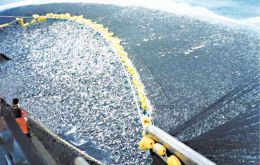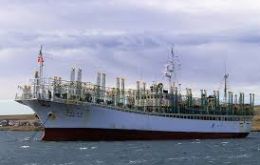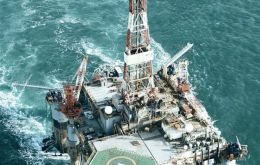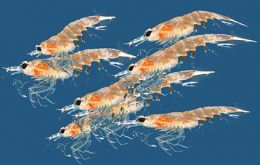MercoPress. South Atlantic News Agency
Fisheries
-
Thursday, April 23rd 2015 - 09:07 UTC
NOAA Fisheries names three Latam countries in illegal fishing activities

United States NOAA Fisheries (National Oceanic and Atmospheric Administration) has released its 2015 Biennial Report to Congress highlighting U.S. findings and analyses of foreign illegal, unreported, and unregulated (IUU) fishing activities and of by-catch of protected species and shark catch on the high seas for foreign fleets.
-
Wednesday, April 22nd 2015 - 15:37 UTC
Spain to invest 421m Euros to promote and develop aquaculture

Spain's Minister of Agriculture, Food and Environment, MAGRAM, Isabel Garcia Tejerina, announced that 421 million Euros will be allocated to the Multiannual Aquaculture Strategic Plan 2014/2020. The plan outlines how aquaculture will be conducted in coming years in the framework of the new EU Common Fisheries Policy (CFP) and the European Maritime and Fisheries Fund (EMFF).
-
Tuesday, April 21st 2015 - 07:22 UTC
Significant blow to toothfish poaching in Antarctica and Patagonian waters

Operation Icefish, Sea Shepherd's first campaign to target Illegal, Unregulated, Unreported (IUU) fishing of toothfish in the waters of Antarctica, and the organization's longest, continuous at-sea campaign to date has concluded with unexpected success.
-
Thursday, April 16th 2015 - 22:23 UTC
Greenpeace reacts to NOAA report showing U.S. overfished stocks at all-time low

The National Oceanic and Atmospheric Administration (NOAA) released the 2014 Status of U.S. Fisheries report, which indicates that the number of US fish stocks listed as overfished or subject to overfishing has dropped to an all-time low since 1997, when NOAA began tracking stock status.
-
Friday, April 10th 2015 - 03:00 UTC
Falklands' bumper year for Illex squid predicts fisheries scientist

The Falkland Islands are set to have another bumper year of Illex squid catches with 150,000 tons already caught this season. Last year the fishery had a record catch of over 306,000 tons. It is, “a record catch at this point in the season, at least in the last 25 years of the fishery” Senior Scientist at the Falkland Islands Fisheries Department Dr Sasha Arkhipkin, told Penguin News.
-
Monday, March 30th 2015 - 07:13 UTC
Falklands economy main contributor is fishing industry: 34% of GDP in 2012

Measured by GDP, fishing is the most important industry in the Falkland Islands and in 2012 contributed 34% to GDP, according to the State of the Falklands Economy report from the FIG Policy Unit.
-
Sunday, March 29th 2015 - 09:47 UTC
Sea Shepherd receives unexpected help in the 100-day chase of poacher

One of Australia's biggest commercial fishing businesses has joined forces with militant environment group Sea Shepherd in an unheralded bid to stop pirate fishing boats. David Carter, from Perth-based Austral Fisheries, said the company was joining forces with Sea Shepherd because it wanted to lend moral support to the group's efforts to stamp out poaching.
-
Thursday, March 26th 2015 - 14:41 UTC
Falklands' main import trading partner is the UK with 87% of all goods

The United Kingdom is the main import trading partner of the Falkland Islands with 87% of all imported goods coming from the UK in 2012 (Customs and Immigration 2013) with the rest imported mostly from Chile and Uruguay, according to the latest report on the Falklands' “State of the Economy”.
-
Wednesday, March 25th 2015 - 07:07 UTC
Falklands' economy performance impressive, although volatile and vulnerable

The Falkland Islands economy has witnessed impressive, although volatile, growth in recent years with unemployment rates low enough to be the envy of most countries in the world and the government is free of debt, according to the latest “State of the Economy” released by the Falklands Policy Unit.
-
Wednesday, March 18th 2015 - 13:17 UTC
First call for proposals from Antarctic Wildlife Research Fund

The Antarctic Wildlife Research Fund (AWR) issued this week its first call for proposals, inviting applications from scientific researchers who can aid in determining the impact of the krill fishing industry on the Antarctic marine ecosystem. Such research will serve to ensure ecosystem protection, while improving the management basis for the fishery.
